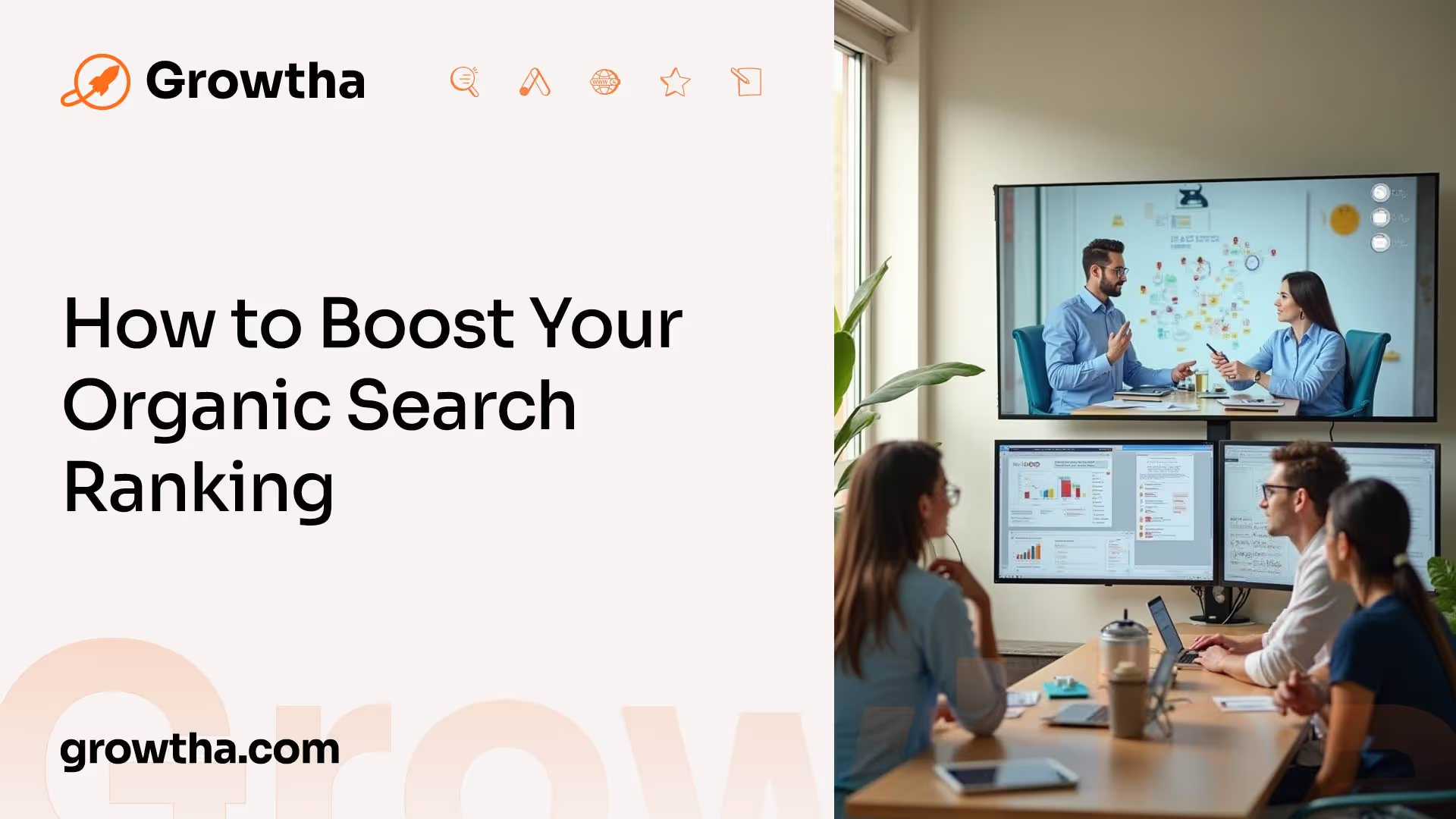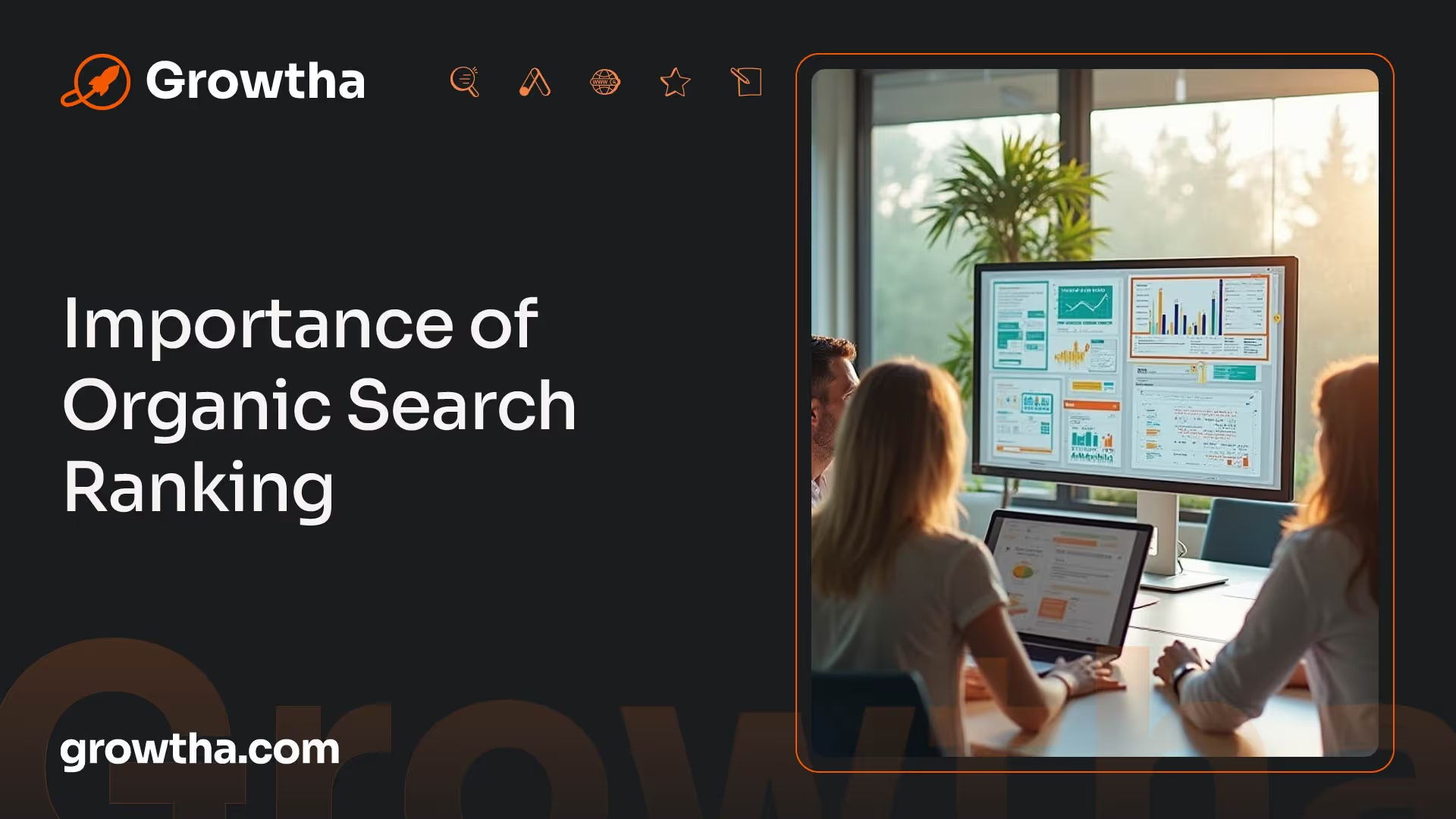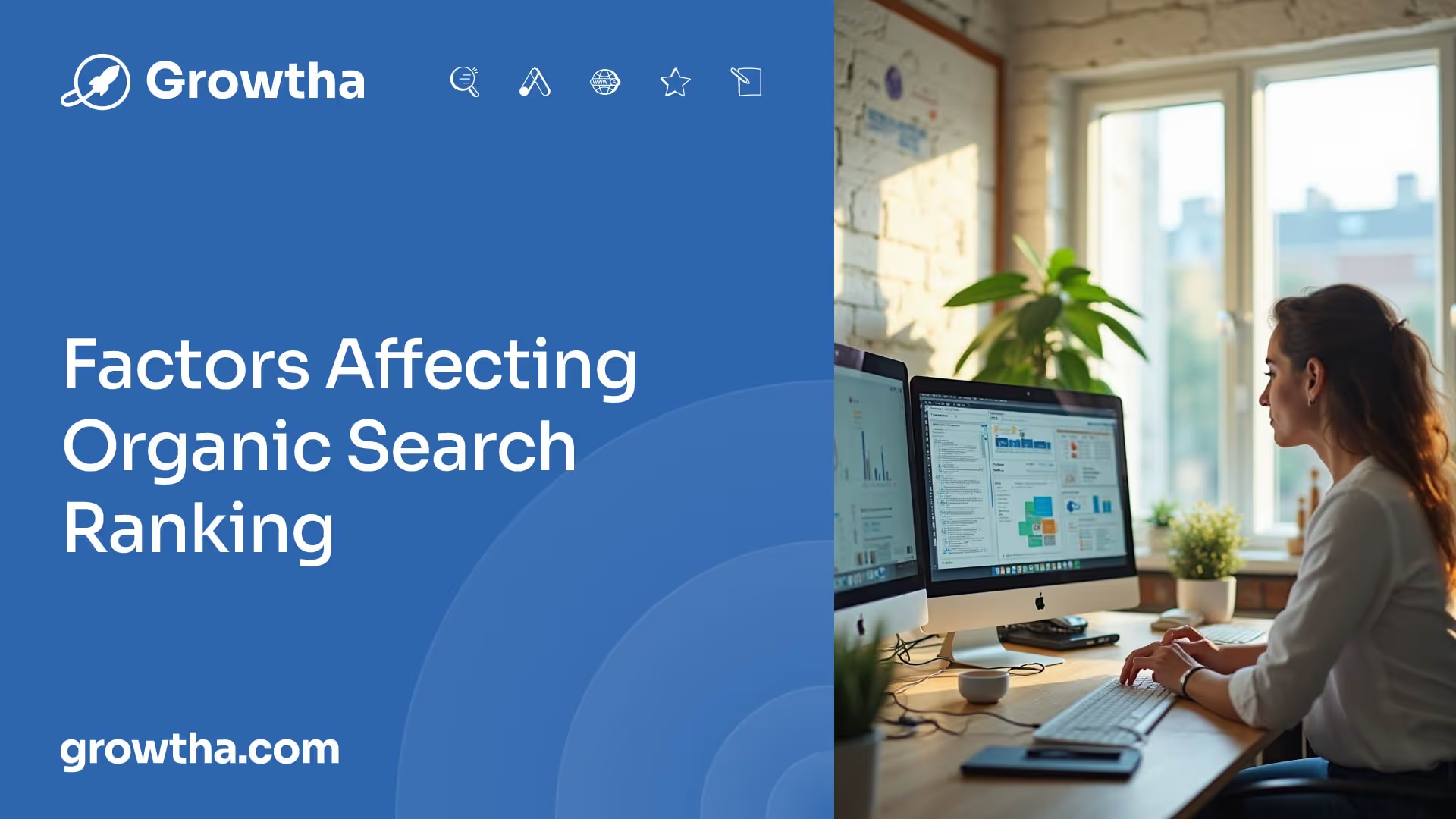How to Boost Your Organic Search Ranking
Achieving a high organic search ranking is essential for driving organic traffic to a website without having to rely on paid advertising.


How to Boost Your Organic Search Ranking
Understanding Organic Search Ranking
To effectively improve organic search rankings, it is crucial to understand the importance of organic search ranking and the various factors that influence it.
Importance of Organic Search Ranking

Organic search ranking refers to the position at which a website appears in the search engine results pages (SERPs) for a particular search query. Achieving a high organic search ranking is essential for driving organic traffic to a website without having to rely on paid advertising.
Organic search ranking holds significant importance for businesses and website owners. Here's why:
- Increased Visibility: A higher organic search ranking improves the visibility of a website to a wider audience. When a website appears on the first page of search results, it is more likely to receive clicks and visits from users searching for relevant information.
- Credibility and Trust: Websites that rank higher organically are often perceived as more credible and trustworthy by users. Users tend to trust search engines to deliver the most relevant and valuable results, so appearing higher in the rankings can enhance a website's credibility.
- Targeted Traffic: Organic search rankings help attract targeted traffic to a website. When a website ranks well for specific keywords or search queries, it is more likely to attract users who are actively searching for the products, services, or information the website offers.
- Cost-Effective: Unlike paid advertising methods, achieving high organic search rankings does not require direct financial investment. Organic traffic can be a cost-effective way to generate leads and conversions for businesses.
- Long-Term Sustainability: Building a strong organic search presence through high-quality content and SEO strategies can lead to long-term sustainability. By focusing on creating valuable content that meets the evolving needs of the audience, a website can future-proof its SEO strategy, even in the face of algorithm updates and industry shifts.
Factors Affecting Organic Search Ranking

Several factors influence organic search ranking. While search engines like Google consider numerous elements when determining rankings, some key factors include:
- Quality Content: High-quality content plays a crucial role in organic search engine optimization (SEO). Quality content attracts search engine bots, helps them understand the content, and rank it appropriately [1].
- Backlinks: Backlinks, or links from external websites to your site, are an essential factor in organic SEO ranking improvement. Quality content is more likely to be shared and linked to by other websites, generating valuable backlinks.
- Relevance: Search engines aim to match user queries with the most relevant content. High-quality content that addresses specific user questions or needs is more likely to rank well [1].
- Keyword Optimization: Quality content naturally integrates relevant keywords and phrases, enhancing a website's visibility for search queries. Prioritizing user intent and readability over keyword density is crucial, as search engines value content that provides genuine value to users [2].
- User Experience: Factors like page load speed, mobile-friendliness, and overall user experience contribute to organic search rankings. Search engines prioritize websites that offer a positive and seamless user experience.
Understanding these factors and implementing effective strategies to improve them enables website owners to enhance their organic search rankings and attract valuable organic traffic.
Creating High-Quality Content

When it comes to improving organic search rankings, creating high-quality content is paramount. Quality content plays a crucial role in organic search engine optimization (SEO) by helping websites rank higher in search engine results pages (SERPs) through natural, unpaid methods [1].
Role of Quality Content in SEO
Quality content is the backbone of a successful organic SEO strategy. It attracts search engine bots, such as Google crawlers, helping them understand the content and rank it appropriately [1].
In addition to benefiting search engines, high-quality content improves user experience by keeping visitors engaged and reducing bounce rates. When users find valuable and relevant content, they are more likely to stay on the site and explore further. This signals to search engines that the website is valuable, resulting in improved organic search rankings [1].
Read: Secrets to Optimizing Content for Higher SEO Rankings
Writing Relevant and Engaging Content

Relevance is a crucial aspect of creating high-quality content. Search engines aim to match user queries with the most relevant content. Therefore, it's essential to understand your target audience and their search intent. By addressing specific user questions or needs with your content, you increase the likelihood of ranking well in organic search results.
To write relevant and engaging content, consider the following tips:
- Conduct keyword research: Identify relevant keywords and phrases that align with your content and target audience. This will help you optimize your content for search engines and improve its visibility.
- Create comprehensive content: Provide valuable and in-depth information that answers user queries. Consider including relevant images, videos, or infographics to enhance the user experience.
- Use clear and concise language: Write in a manner that is easy to understand for your target audience. Avoid jargon or complex terminology that might confuse readers.
- Organize content with headings and subheadings: Use proper formatting and structure to make your content scannable. Headings and subheadings help users navigate your content and improve readability.
- Include internal links: Link to other relevant pages within your website to guide users to related content. Internal linking also helps search engines understand the structure and hierarchy of your website.
Incorporating Keywords in Content

Keywords are an essential aspect of SEO. By incorporating relevant keywords in your content, you increase the likelihood of ranking well for those terms. However, it's important to use keywords naturally and avoid keyword stuffing, as search engines prioritize content that provides value to users.
To effectively incorporate keywords in your content:
- Use keywords in the page title: Include the target keyword in the title tag of your webpage to signal its relevance to search engines.
- Utilize keywords in headings and subheadings: Incorporate keywords in the headings and subheadings of your content to provide context and improve search engine visibility.
- Sprinkle keywords throughout the content: Include keywords naturally throughout the content, ensuring they flow seamlessly and make sense to readers.
- Optimize meta descriptions: Craft compelling meta descriptions that include relevant keywords. Meta descriptions provide a concise summary of your content in search engine results and can influence click-through rates.
Remember, creating high-quality content is an ongoing process. Regularly update and refresh your content to ensure its relevance and accuracy. By consistently providing valuable and engaging content, you can enhance your organic search rankings and attract more visitors to your website.
Building Backlinks for SEO
One of the key factors that can significantly impact organic search ranking is the presence of backlinks. Backlinks are links from external websites that point to your website. They are considered to be a vote of confidence from other sites, indicating the relevance and credibility of your content. In this section, we will explore the importance of backlinks in organic SEO and discuss strategies to generate them.
Importance of Backlinks in Organic SEO
Backlinks play a crucial role in organic SEO as they are an essential factor for improving search engine rankings. When other reputable websites link to your content, search engines perceive it as a signal of authority and relevance. This can result in higher visibility and improved rankings in search engine results pages (SERPs).
Quality content is a major driving force behind backlinks. When you produce high-quality content, it is more likely to be shared and linked to by other websites. According to Medium, quality content generates backlinks as it is more likely to be shared by other websites.
Establishing your website as an authority in your industry through compelling content can also attract backlinks from reputable sources. This builds trust and credibility over time, as mentioned by LinkedIn. Search engines take these backlinks into consideration when determining the rankings of your web pages.
It's worth noting that backlinks should come from relevant and authoritative websites. A few high-quality backlinks from reputable sources can carry more weight than numerous low-quality backlinks. Therefore, it is essential to focus on building quality backlinks rather than simply accumulating a large quantity.
Strategies to Generate Backlinks
Generating backlinks requires proactive efforts to attract attention and interest from other websites. Here are some effective strategies to help you generate backlinks:
- Create high-quality and valuable content: Producing compelling content that addresses the needs and interests of your target audience is crucial. Valuable content increases the likelihood of being shared and linked to by other websites. This approach offers long-term sustainability in SEO, as it focuses on creating content that meets the evolving needs of the audience [2].
- Guest blogging: Writing guest posts for relevant and authoritative websites in your industry can be an effective way to obtain backlinks. By providing valuable content to these websites, you can include a link back to your own website within the author bio or content itself. This helps to increase your website's visibility and credibility.
- Building relationships and networking: Actively engage with others in your industry, such as influencers, bloggers, and website owners. Building relationships can lead to opportunities for collaborations, guest appearances, and mentions on their platforms. This can result in valuable backlinks to your website.
- Content promotion and outreach: After creating high-quality content, promote it through various channels, such as social media, email newsletters, and industry forums. By reaching out to relevant individuals and organizations in your industry, you can increase the chances of them linking to your content.
- Broken link building: Identify broken links on authoritative websites within your industry and reach out to the website owners or administrators. Offer them a replacement link to your relevant and high-quality content. This strategy provides value to the website owner by helping them fix broken links while gaining a backlink for your website.
Remember, when implementing these strategies, it's important to focus on building organic and natural backlinks. Avoid any practices that violate search engine guidelines, such as buying or exchanging backlinks, as this can lead to penalties and harm your SEO efforts.
By consistently implementing these strategies and creating valuable content, you can increase the likelihood of attracting high-quality backlinks, improving your organic search ranking, and driving more organic traffic to your website.
On-Page SEO Best Practices
To improve your organic search ranking, implementing effective on-page SEO techniques is crucial. By optimizing page titles and meta descriptions, URL structure, and incorporating schema markup, you can enhance your website's visibility and attract more organic traffic.
Optimizing Page Titles and Meta Descriptions
Page titles and meta descriptions play a vital role in both search engine rankings and click-through rates. It is recommended to include relevant keywords that accurately describe the content of the page, as this helps search engines understand the page's topic and relevance.
To optimize your page titles and meta descriptions, keep the following best practices in mind:
- Keep the title tags below 60 characters and meta descriptions below 160 characters to ensure they are displayed properly in search results.
- Craft compelling and concise descriptions that entice users to click on your website.
- Tailor each page's title and meta description to accurately represent the unique content it offers.
URL Structure and Optimization
URLs should be concise, descriptive, and user-friendly to improve SEO and user experience. Including the main keyword in the URL and using hyphens to separate words can enhance search engine visibility and make URLs more readable.
Consider the following tips for optimizing your URL structure:
- Keep URLs short and avoid unnecessary, complex strings of characters.
- Use keywords that accurately describe the page's content within the URL.
- Utilize hyphens to separate words for better readability.
Schema Markup for Enhanced Visibility
Schema markup provides additional context about the content on web pages to search engines, resulting in potentially higher click-through rates and improved visibility [3]. By including schema markup, you can enhance traditional search results with additional information such as star ratings, pricing, recipe steps, and more.
To leverage schema markup effectively:
- Identify the most relevant schema types for your content. This can include schemas for articles, products, reviews, and more.
- Implement the appropriate schema markup on your web pages using the structured data format recommended by schema.org.
- Ensure the schema markup is accurate and up to date, providing search engines with valuable information about your content.
By optimizing page titles and meta descriptions, refining your URL structure, and incorporating schema markup, you can significantly improve your on-page SEO. These practices help search engines understand your content, enhance the user experience, and increase your chances of ranking higher in organic search results.
The Impact of Site Speed on SEO
In the world of organic search rankings, site speed plays a crucial role in determining a website's visibility and success. The importance of site speed in organic rankings cannot be overstated, as it directly affects user experience and search engine optimization (SEO).
Importance of Site Speed in Organic Rankings
Google recognized the significance of site speed as early as 2010 when it announced that it would factor site speed into its search rankings. This decision was driven by the understanding that a slow website can have a negative impact on user experience. In fact, research shows that 53% of mobile sites are abandoned if they take longer than 3 seconds to load [4].
Google's commitment to prioritizing site speed continued with the introduction of the "Speed Update" to mobile search results in 2018. By 2021, Google incorporated "Core Web Vitals" metrics as part of its site speed and user experience ranking factors, further emphasizing the ongoing significance of site speed in SEO rankings [5].
Additionally, slow-loading pages can hinder crawl efficiency for search engines like Google. A website with slow-loading pages may experience limitations in the frequency and depth of crawling important content. Hence, improving page load times is crucial for optimizing crawl speed and frequency within a domain, ensuring that search engines can effectively index the content [5].
Moreover, site speed has a direct impact on the conversion rates of websites. Studies have shown that pages with quicker loading times tend to have higher conversion rates. For B2C e-commerce sites, pages loading in under a second can lead to 2.5 times more conversions compared to those with an average load speed of 5 seconds. The conversion rate increases to 3 times for B2B sites.
Strategies to Improve Website Loading Speed
Given the importance of site speed in organic search rankings, it is crucial to implement strategies to improve the loading speed of your website. Here are some effective strategies to consider:
- Optimize image sizes: Images often contribute to the bulk of a web page's file size. Compressing and optimizing images can significantly reduce the loading time without sacrificing image quality. Use image compression tools or plugins to automatically optimize images.
- Minimize HTTP requests: Reduce the number of elements on your web page that require separate HTTP requests, such as scripts and stylesheets. Combining CSS and JavaScript files and eliminating unnecessary elements can help minimize the number of requests, resulting in faster loading times.
- Enable browser caching: Configure your server to include caching headers, allowing visitors' browsers to store certain elements of your website. This way, returning visitors don't have to download the same files repeatedly, improving overall loading speed.
- Reduce server response time: Optimize your server's performance by using a reliable hosting provider, minimizing the use of resource-intensive plugins or scripts, and implementing caching mechanisms such as content delivery networks (CDNs). These steps can help reduce server response time and improve loading speed.
Remember, site speed is not only important for SEO but also for providing a positive user experience. By implementing these strategies and continuously monitoring your website's performance, you can enhance your organic search ranking and ensure that visitors have a smooth and efficient browsing experience.
Technical SEO Best Practices
To improve your website's organic search ranking and ensure optimal performance, it's crucial to implement technical SEO best practices. Technical SEO involves various activities, such as creating XML sitemaps, setting up redirects, optimizing URL structure, and monitoring SEO performance. By following these practices, you can enhance your website's architecture and increase its visibility in search engine results.
XML Sitemaps and Redirects
Creating an XML sitemap is an essential step in technical SEO. An XML sitemap allows search engines to understand the structure and hierarchy of your website, making it easier for them to crawl and index your pages. It provides a roadmap for search engine bots to discover and navigate through your website's content.
In addition to XML sitemaps, setting up redirects is crucial for maintaining a seamless user experience and preserving your website's SEO value. Redirects ensure that visitors are directed to the correct page when they encounter a broken link or a page that has been moved or deleted. By implementing proper redirects, you can prevent users from encountering 404 errors and retain the link equity that your website has accumulated.
URL Structure Optimization
Optimizing your website's URL structure is another important aspect of technical SEO. A well-structured URL can enhance user experience and make it easier for search engines to understand the topic of your page. It's recommended to use descriptive and keyword-rich URLs that accurately reflect the content of the page.
Here are some best practices for URL structure optimization:
- Keep URLs concise and easy to read.
- Include relevant keywords in the URL.
- Use hyphens to separate words within the URL.
- Avoid using unnecessary parameters or dynamic characters in the URL.
By optimizing your URL structure, you can improve the click-through rate from search engine results and make it easier for users to navigate your website.
Monitoring SEO Performance
Regularly monitoring your website's SEO performance is crucial for staying ahead of the competition and achieving organic ranking success. By tracking your website's search engine visibility and measuring its overall performance, you can identify areas that require improvement or additional optimization.
Here are some key metrics to monitor for SEO performance:
- Organic search traffic: Track the number of visitors coming to your website through organic search results.
- Keyword rankings: Monitor the positions of your targeted keywords in search engine results pages (SERPs).
- Page load speed: Measure the time it takes for your website to load, as slower websites may experience higher bounce rates.
- Click-through rate (CTR): Analyze the percentage of users who click on your website's link in search results.
- Indexing and crawlability: Ensure that search engines are able to crawl and index your website's pages effectively.
By analyzing these metrics and making data-driven decisions, you can continuously improve your website's technical SEO and enhance its organic search ranking.
By implementing technical SEO best practices, such as XML sitemaps, redirects, URL structure optimization, and regular monitoring of SEO performance, you can maximize the potential of technical SEO and increase your website's visibility in search engine results. These strategies not only improve organic traffic and rankings but also provide visitors with a seamless user experience across devices.
The Power of On-Page SEO
When it comes to improving organic search rankings, on-page SEO plays a crucial role. On-page SEO, also known as on-site SEO, involves optimizing various front-end and back-end components of a website to ensure it ranks well in search engines and attracts new traffic. It encompasses content elements, HTML elements, and site architecture elements, all of which contribute to enhancing the visibility and relevance of a website in search engine results.
Content Elements of On-Page SEO
Content is a fundamental element of on-page SEO. It involves creating high-quality, relevant, and engaging content that aligns with the targeted keywords and topics. Proper keyword research is essential to identify the most relevant keywords and topics for your content. Tools such as Ahrefs, AnswerthePublic, SE Ranking, and UberSuggest can assist in conducting keyword research.
By incorporating these relevant keywords naturally into your content, you can increase the visibility of your website in search engine results. However, it's important to prioritize the user experience and avoid keyword stuffing, as search engines value high-quality and reader-friendly content.
HTML Elements of On-Page SEO
HTML elements play a crucial role in on-page SEO as they provide information to search engines, organize content, and enhance the overall user experience. Key HTML elements to optimize include:
- Page Titles: These HTML
<title>tags should accurately describe the content of each page and include relevant keywords. - Headers: Proper use of HTML header elements, such as
<h1>,<h2>,<h3>, etc., helps structure the content and improve readability. - Meta Descriptions: These brief summaries, displayed in search engine results, should be informative and enticing, encouraging users to click.
- Image Alt-Text: Providing descriptive alt-text for images helps search engines understand the content and improves accessibility.
- Structured Markup: Implementing structured markup, such as schema.org, can enhance the appearance of search engine results by adding additional information [6].
By optimizing these HTML elements, you can make your website more understandable and relevant to search engines, improving its organic search ranking.
Site Architecture Elements of On-Page SEO
Site architecture elements focus on the overall structure and organization of a website. These elements contribute to ensuring that search engines can easily crawl and index the website, leading to better visibility in search results. Key site architecture elements to consider include:
- Page URLs: Using descriptive and keyword-rich URLs helps both users and search engines understand the content of each page.
- Internal Linking: Creating a logical and well-structured internal linking system helps search engines discover and navigate through your website's content.
- Mobile Responsiveness: With the increasing use of mobile devices, having a mobile-responsive website is crucial for providing a seamless user experience and improving search rankings.
- Site Speed: Optimizing website loading speed is vital, as it contributes to better user experience and is a factor considered by search engines when ranking websites.
By focusing on these site architecture elements, you can improve the accessibility and navigability of your website, leading to better organic search rankings.
Understanding and implementing the various content, HTML, and site architecture elements of on-page SEO can significantly impact your website's visibility and ranking in organic search results. By optimizing these elements, you can improve the relevance, user experience, and overall performance of your website, ultimately attracting more organic traffic.
References
[1]: https://medium.com/@iqrasadaf.geo/why-quality-content-is-matter-for-organic-seo-dddfb40abebb
[2]: https://www.linkedin.com/pulse/why-quality-content-matter-organic-seo-edigitus-dizuc
[3]: https://www.oshyn.com/blog/how-to-implement-top-5-on-page-seo-best-practices
[4]: https://www.cloudflare.com/learning/performance/how-website-speed-boosts-seo/
[5]: https://www.lumar.io/blog/best-practice/why-site-speed-matters-for-seo/
[6]: https://blog.hubspot.com/blog/tabid/6307/bid/33655/a-step-by-step-guide-to-flawless-on-page-seo-free-template.aspx







